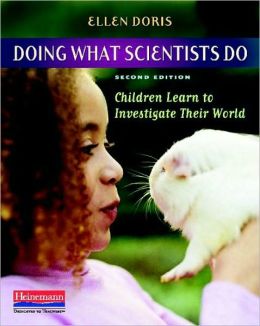Ten years ago, you couldn't walk into a K-1 classroom without seeing a nature center. There would undoubtedly be magnifying glasses, objects to observe and many other science centered activities. Now when you walk into a classroom, what do you see? Reading and Math. Now, I am not saying that there shouldn't be reading and math in an early childhood classroom, I just want you to consider the reasoning behind early childhood science.
Recently, I have reread one of my favorite books. Doing what Scientists do by Ellen Doris. The book has gotten a facelift and upgrade since the original version, but the basic premises are the same.
Recently, I have reread one of my favorite books. Doing what Scientists do by Ellen Doris. The book has gotten a facelift and upgrade since the original version, but the basic premises are the same.
How do children learn?
· By doing
· Constructing
knowledge through collaboration
· Behavior and
thinking take time
· As
individuals
· Revise their
understanding of the world through experiences
All of these ideas are true, and are especially true in science. As a constructivist teacher, I never tire of hearing these thoughts. And to make science meaningful for every child, science lessons should follow these guiding beliefs:
Science is a process of inquiry and investigation
· Familiar everyday phenomena provide a rich focus for science study
· Children learn through their own activity
· Teachers can also be active investigators
· Applying knowledge of child development contributes to science teaching
· A balance between structure and freedom in the classroom is important
· Each class member has an important contribution to make
· Collaboration is important
Do you agree? I agree that these beliefs are essential from pre K to grade 12...but what do I know?


I definitely agree with the post written by Ms. Leslie Lausten. It points out in a clear and concise manner how the study of science in early childhood classrooms is lacking. The study of English and Math dominate early childhood classrooms to the disadvantage of pre-schoolers. Science can provide pre-schoolers with skills they can use as they further their education. This includes hands on activities where pre-schoolers can work independently as well as collaborate with fellow students. Beginning to think in a new way to solve problems about the world around them. Science provides pre-schoolers with the opportunity to bring innovative ideas and solutions to the scientific world and its mysteries.
ReplyDelete